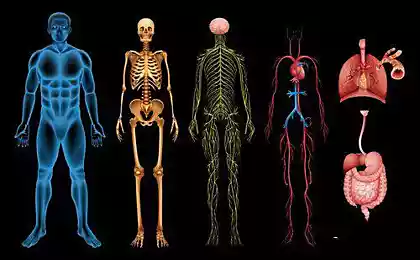229
How to tell if a loved one is starving or secretly eating
To survive, we need to eat. The state of our health depends on what, when and how we eat, that is, on our eating behavior. In the modern world, a contradictory trend has arisen: against the background of the general promotion of healthy eating, many people suffer from eating disorders.

DepositPhotos
You've probably heard of anorexia and bulimia. Alas, very often these diseases do not attach importance, they consider the whims of young people pursuing modeling. beauty. The frivolous attitude to anorexia and bulimia, myths and misunderstanding of the causes of these diseases contribute to the increase in the number of patients. Let’s figure out what these ailments are and how dangerous they are to human health and life.
Eating disorder Eating disorder This is a severe mental disorder associated with obsession with food or body shape, which can cause irreparable harm to human health. If left untreated, it can even cause death in a few years.
According to statistics, up to 13% of young people suffer from various types of eating disorders, the most famous of which are anorexia and bulimia, or compulsive overeating. Most of the patients are girls.

DepositPhotos anorexia - psychopathological fear of the completeness and flabbiness of the figure, which becomes an obsession. At the same time, a person literally starves himself, experiencing an aversion to food, which leads to exhaustion of the body and a very strong loss of body weight. And then they develop. hormonesviolation of metabolism and the work of organs.

DepositPhotos Eating disorders It forces girls aged 12-19 to strictly control their weight below normal. Following the standards of beauty, wanting to be thin, young women torture their body, causing it irreversible damage that can lead to tragedy.
A predisposition to anorexia is observed most often in girls who tend to do everything perfectly ("Awards syndrome"), who doubt themselves, with low self-esteem, who react sharply to criticism, are subject to constant ridicule of peers and depression.

DepositPhotos
You can’t fix things just by making someone eat! Those suffering from anorexia are deeply convinced of the correctness of their diet. Anyone who attacks their weight becomes an enemy. A very delicate approach is important so as not to aggravate the patient's condition. Here are the signs in the appearance and behavior of the patient should pay attention to relatives.
How to Recognize Anorexia
bulimia Another known eating disorder. Like anorexia, bulimia in men is rare and more common among women aged 15–35. People with bulimia experience "wolf hunger" and eat huge amounts of even inedible foods at a time, up to the feeling of painful heaviness in the abdomen. After that, cause vomiting or use laxatives and diuretics. Bulimia and its manifestations are a projection of feelings and emotions on food.

During or after an attack of excessive overeating, a person suffers from feelings of guilt, loneliness, shame, anxiety and self-loathing. There may be similar symptoms as with anorexia, while maintaining a relatively normal weight. Take a closer look at your family and friends: there are some signs that can give a patient bulimia.
How to recognize bulimia
DepositPhotos
The main task is to restore normal body weight and proper diet, eating habits and lifestyle. But if you do not restore a healthy worldview and adequate perception of the body, it is almost impossible to suggest to patients that you need to obey the recommendations of the doctor.

DepositPhotos
Eating disorders are not fads, youthful maximalism, or a person’s conscious choice. A patient with anorexia can not just be taken and fattened, and bulimic can not be forced not to overeat. Working with a psychologist and a course of treatment with antidepressants will help change the opinion of patients about the ideal figure. But no treatment will be effective if the patient denies the disease, does not want to change and accept help.

DepositPhotos
Eating disorders are very common, but they are difficult to detect – the sick person does not want to publicize their problems. The earlier the disease is diagnosed, the greater the chances of healing. With proper treatment, there is every chance of recovery even in the late stages of the disease.
If you suffer from an eating disorder or have such patients in your environment, seek help from a doctor immediately before it is too late. Tap the “Share on Facebook” button to let more people know about the dangers of these diseases.

DepositPhotos
You've probably heard of anorexia and bulimia. Alas, very often these diseases do not attach importance, they consider the whims of young people pursuing modeling. beauty. The frivolous attitude to anorexia and bulimia, myths and misunderstanding of the causes of these diseases contribute to the increase in the number of patients. Let’s figure out what these ailments are and how dangerous they are to human health and life.
Eating disorder Eating disorder This is a severe mental disorder associated with obsession with food or body shape, which can cause irreparable harm to human health. If left untreated, it can even cause death in a few years.
According to statistics, up to 13% of young people suffer from various types of eating disorders, the most famous of which are anorexia and bulimia, or compulsive overeating. Most of the patients are girls.

DepositPhotos anorexia - psychopathological fear of the completeness and flabbiness of the figure, which becomes an obsession. At the same time, a person literally starves himself, experiencing an aversion to food, which leads to exhaustion of the body and a very strong loss of body weight. And then they develop. hormonesviolation of metabolism and the work of organs.

DepositPhotos Eating disorders It forces girls aged 12-19 to strictly control their weight below normal. Following the standards of beauty, wanting to be thin, young women torture their body, causing it irreversible damage that can lead to tragedy.
A predisposition to anorexia is observed most often in girls who tend to do everything perfectly ("Awards syndrome"), who doubt themselves, with low self-esteem, who react sharply to criticism, are subject to constant ridicule of peers and depression.

DepositPhotos
You can’t fix things just by making someone eat! Those suffering from anorexia are deeply convinced of the correctness of their diet. Anyone who attacks their weight becomes an enemy. A very delicate approach is important so as not to aggravate the patient's condition. Here are the signs in the appearance and behavior of the patient should pay attention to relatives.
How to Recognize Anorexia
- A sharp and significant weight loss in a short time.
- A panicked fear of being full.
- Sleep disturbance.
- Lack of appetite.
- Eating and cooking separately from everyone.
- Hiding food, feeding it to younger family members or animals
- Constant use of laxatives, inducing vomiting and the use of enemas, excessive exercise.
- Constant irritability, temper.
- Irregularity or complete disappearance of the menstrual cycle in girls.
- Severe deterioration of the skin and hair.
- Isolation from society.

DepositPhotos
bulimia Another known eating disorder. Like anorexia, bulimia in men is rare and more common among women aged 15–35. People with bulimia experience "wolf hunger" and eat huge amounts of even inedible foods at a time, up to the feeling of painful heaviness in the abdomen. After that, cause vomiting or use laxatives and diuretics. Bulimia and its manifestations are a projection of feelings and emotions on food.

During or after an attack of excessive overeating, a person suffers from feelings of guilt, loneliness, shame, anxiety and self-loathing. There may be similar symptoms as with anorexia, while maintaining a relatively normal weight. Take a closer look at your family and friends: there are some signs that can give a patient bulimia.
How to recognize bulimia
- Regular uncontrolled bouts of overeating.
- Regular use of cleansing enemas, laxatives, mechanical inducing vomiting, exhausting fasting.
- Low self-esteem, fixation on body shape and weight.
- A constant fear of gaining weight at normal weight.
- Bad skin, hair loss, stomach problems, marks on the knuckles of the fingers from the teeth.
- Dehydration and seizures associated with electrolyte imbalance.
- Inflammation of the parotid gland due to frequent vomiting.
- Intestinal disorders, heart disease, menstrual disorders.

DepositPhotos
The main task is to restore normal body weight and proper diet, eating habits and lifestyle. But if you do not restore a healthy worldview and adequate perception of the body, it is almost impossible to suggest to patients that you need to obey the recommendations of the doctor.

DepositPhotos
Eating disorders are not fads, youthful maximalism, or a person’s conscious choice. A patient with anorexia can not just be taken and fattened, and bulimic can not be forced not to overeat. Working with a psychologist and a course of treatment with antidepressants will help change the opinion of patients about the ideal figure. But no treatment will be effective if the patient denies the disease, does not want to change and accept help.

DepositPhotos
Eating disorders are very common, but they are difficult to detect – the sick person does not want to publicize their problems. The earlier the disease is diagnosed, the greater the chances of healing. With proper treatment, there is every chance of recovery even in the late stages of the disease.
If you suffer from an eating disorder or have such patients in your environment, seek help from a doctor immediately before it is too late. Tap the “Share on Facebook” button to let more people know about the dangers of these diseases.
The juice of this plant leaves burns, friends, be careful
Why wrap zucchini in film and leave in the refrigerator
























